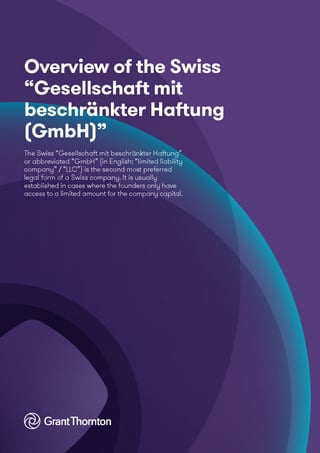
In contrast to the Swiss “Aktiengesellschaft (AG)” which requires a capital of CHF 100’000, of which at least 50% have to be paid in for the establishment, the shareholders have the right to manage and represent the company. The person-oriented nature of the GmbH is also reflected in the mandatory registration of the shareholders in the commercial register. This means that information about the shareholder(s) of a GmbH is publicly available.
The GmbH can be defined as an incorporated company with separate legal personality in which one or more natural or legal persons participate. It is liable for its obligations to the extent of the company assets. Each company member participates in the nominal capital by making at least one capital contribution. The articles of association may stipulate obligations to make additional financial and material contributions. The relevant provisions can be found in art. 772 – 827 of the Swiss Code of Obligations.
The main features of the GmbH are summarised as follows:
At least one founder is required. Founders can be Swiss citizens or foreigners, being either individuals or legal entities.
- The registered capital is divided into shares and must amount to at least CHF 20’000. It must be paid-in in cash or shall be covered by contributions in kind.
- Liability is limited to the company capital.
- The establishment of a GmbH demands a formal, notarial incorporation process. The GmbH acquires its legal personality upon its registration in the commercial register.
- The corporate bodies of the GmbH are: shareholders’ meeting as the supreme governing body, the management board as the executive body and the auditors, if any, as the accounts-controlling body.
- Unless otherwise stated in the articles of association, each management board member is entitled to represent the company. At least one member of the management board must have the right of representation. Furthermore, the GmbH must be represented by at least one person who is domiciled in Switzerland.
- In general, there is free choice of the company name. However, the term “GmbH” has to be added to the company name.
- A GmbH must keep company accounts. There needs to be double entry bookkeeping with a balance sheet, an operating or profit and loss account and an inventory.
- An ordinary audit is required for a public company (particularly when listed on the Stock Exchange) and for a company that exceeds two of the following thresholds in two successive financial years: total assets of CHF 20 million, sales of CHF 40 million, and an average of 250 full-time employees over the year.
- Small and medium sized companies which do not exceed the aforementioned thresholds are subject to a limited audit (review). Such small and medium sized companies with less than 10 full-time employees over a year have the right to waive the limited audit (review) entirely if all shareholders agree.


